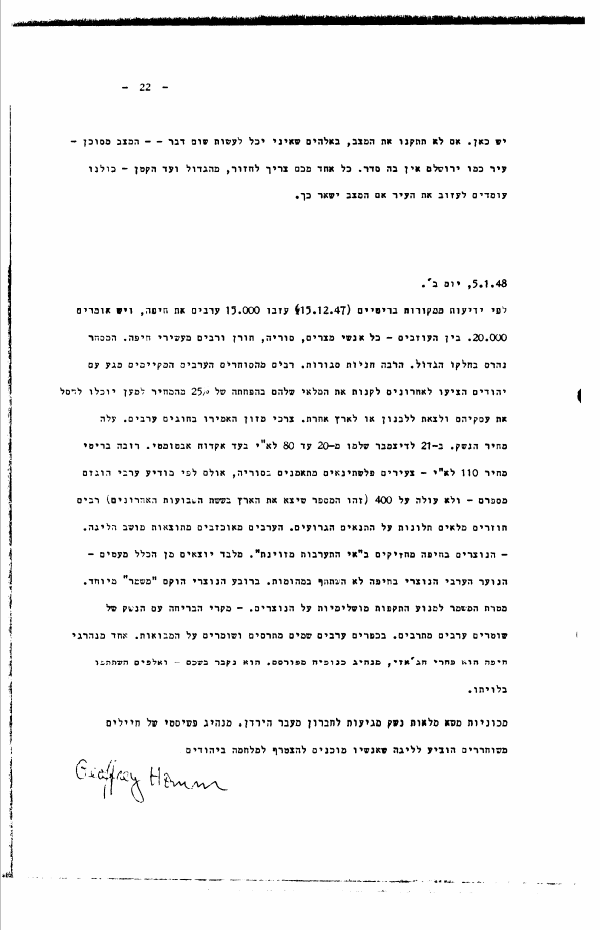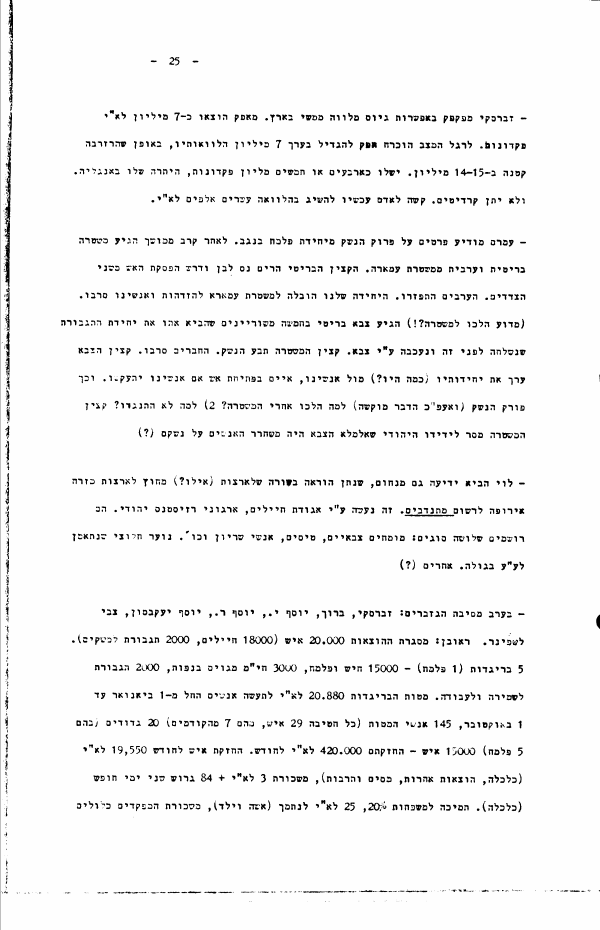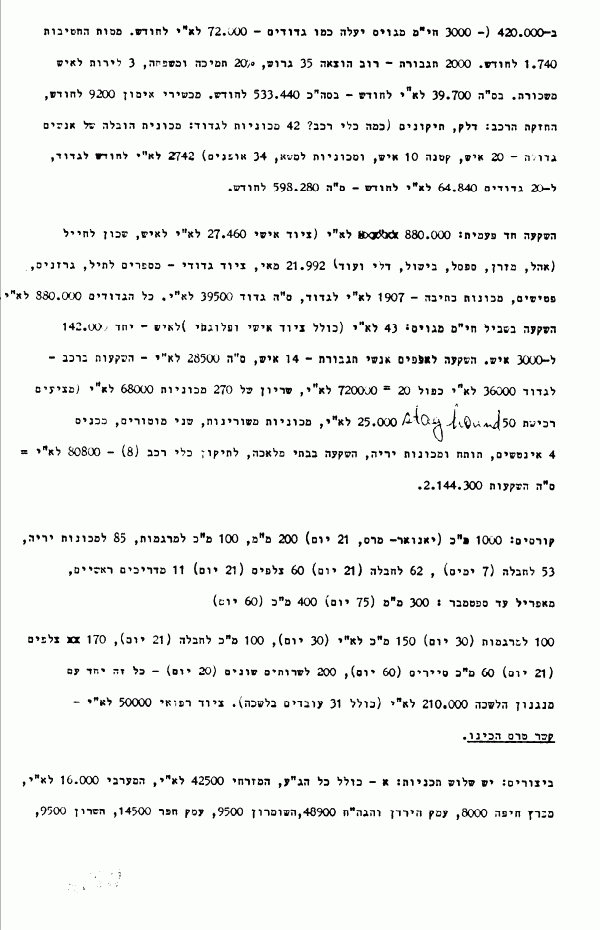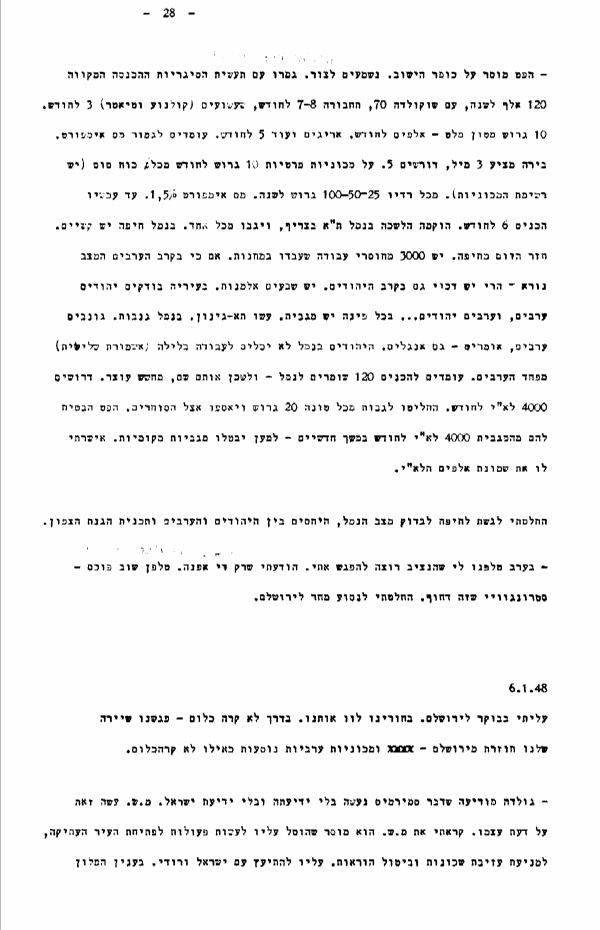Monday, January 5, 1948
According to reports from British sources (December 15, 1947), 15,000 Arabs have left Haifa, and some say 20,000. Among those who left - all the people from Egypt, Syria, Hauran, and many of Haifa's wealthy residents. Commerce has been destroyed for the most part. Many shops are closed. Many of the Arab merchants who are in contact with Jews suggested that the latter buy their stockpiles at a discount of 25%, so that they can close their businesses and leave for Lebanon or another country. Food prices have risen in Arab circles. The price of weapons has risen. On December 21 an automatic gun was going for P£ 20 to 80. A British rifle cost P£ 100. Young Palestinians are training in Syria, but according to an Arab informant their number has been overstated - and doesn't exceed 400 (that's the number [of those] who have left the country over the past six weeks). Many are returning full of complaints about the terrible conditions. The Arabs are disappointed with the outcomes of the [Arab] League meeting.
The Christians in Haifa have adopted "armed non-intervention." Aside from a few exceptions - the Christian Arab youth in Haifa did not participate in the riots. In the Christian Quarter a special guard was established. The aim of the guard is to prevent Muslim attacks on Christians. Cases of Arab policemen fleeing with weapons have increased. In Arab villages they're setting up barricades and guarding passageways. One of those killed in Haifa was Fahri Hijazi [sp.], a famous gang leader. He was buried in Nablus - and thousands attended his funeral.
Trucks loaded with weapons are arriving in Hebron from Transjordan.
Geoffrey Homme, a fascist leader of discharged soldiers [in England], informed the League that his men are prepared to join the war against the Jews.
- Dr. [Yosef] Meir and [Mordechai] Buchbinder [sp.] [Kupat Holim official in the south]: A hospital should be established in Rehovot for the Negev in case of disconnection [in case the Negev is cut off]; [we] need medical equipment (surgical instruments) for Beit Borochov in Haifa (Mount Carmel). In Jerusalem 70 beds have opened at Bikur Holim and Sha'arei Tzedek. Need to equip the Schweitzer Hospital in Tiberias. Need to add 3 barracks to Beilinson Hospital, [thereby] adding 100 beds. When [Tel Aviv Mayor Israel] Rokach was here, he didn't want to cooperate.
Now there's cooperation: there are barracks on the RAF base [Camp Yona] in Tel Aviv, and equipment is needed.
So far those killed have outnumbered the wounded. When positional warfare begins the number of wounded will increase. The hospitals will become crowded.
Rehabilitation centers are needed. In Hadera there's a military camp - bought by the agricultural center for the [Jewish] Agency - it can fit 150-200 beds. There are other demands [for this camp]: the Agency for immigrants, the "Organization" for Hayish [Haganah Field Corps].
During December the upkeep of wounded cost P£ 3,000 - including about 270 wounded. There are another 140 wounded in hospitals. The rest went home.
So [the medical service] has received P£ 15,000, which was spent on: blood transfusion centers P£ 3,500, Schweitzer 1,600, ''Afula Kupat Holim (addition of 75 beds) P£ 2,000, Haifa 3,000, Magen David Adom 2,000, medical equipment 1,500, A. Katznelson is in possession of another P£ 3,000. What they're demanding now is about P£ 40,000. By when? By mid-February (excluding [a hospital in] Gedera). I sent them to Zabrasky - to discuss financial needs, although I warned them that they won't receive money, because there isn't any.
- Dr. [David] Arian informs me that he began working in Committee A of the Situation Committee.
- Gershon Gurevitch [sp.], partner of the Taiber [Bros.] in the Central Company (iron, pipes, and wood) believes that the purchasing arrangements are not right. Dozens of people are running around, going to any merchant, sometimes paying a lot. Purchases need to be coordinated: someone from HaMashbir along with an important merchant will do the buying. Nearly everything is concentrated at HaMashbir and the Central Company. Will Kozlowski [Pinchas Sapir] be suitable? - Yes, what matters is that one person coordinate everything! Incidentally, he conveyed that the army reports having 3,000 tons of barbed wire in the country.
He reports that the UJA's limit [placed on "those with money"] was small.
I asked him whether it's possible to arrange a loan of two million on behalf of the state.
There's no money in the country, but it's a question of trust. With the help of the APC [Anglo-Palestine Company, predecessor of Bank Leumi] it's possible.
- [The engineer Simcha] Blass wants the mortar industry to be handed over to him. He won't be able to take on the chemical side of the shells. I need to discuss this with Shevah [Slavin].
- Perlson [Eliezer Peri] asked that the [Camp Yona] barracks designated for ''aliya be made temporarily available for refugees [from the Tel Aviv outskirts] who were flooded by rains, on the condition that he clear them out at any time. I agreed.
- Yesterday they began unloading the shipment [at Tel Aviv Port]: 400 T.G. [Tommy guns], German rifles, half a million various bullets + 260,000 303 [bullets for English rifles]. They hope to finish unpacking today.
We had an offer for 2-3 containers of instruments from a lieut-col [lieutenant-colonel] by way of a merchant (Bernitsky [sp.]).
- Radical changes will be made at the refineries [after the attack on workers]. The number of workers will be reduced to a minimum - 300 men. The company agrees to have parity [equal numbers] of Jews and Arabs and also parity in terms of notrim [British-appointed auxiliary police] (30-30). 300 workers will suffice for current production. Volinsky [sp.] [of HaShomer HaTza'ir] demanded (this is the workers' demand) the employment of all Jewish workers as an ultimatum. Yisrael [Galili] rejected the ultimatum. The Arab Legion has already been removed [from the refineries]. In its place came the British army.
How many people are needed? - Four, for two weeks.
Okay, you'll receive the necessary budget.
The association is willing to provide more information about the men, in order to take full advantage of them. There are many experts in important professions who have now become soda pop sellers and newspaper distributors. Need to have a roll call of all those who served in other militaries: Poles, Czechs.
- Zabrasky doubts the likelihood of enlisting a genuine loan in the country. About P£ 7 million in deposits have been taken out of APC [Bank Leumi]. In light of the situation APC was forced to increase its loans in the amount of 7 million, so the reserve decreased by 14-15 million. It has about P£ forty or fifty million in deposits. Its balance is in England, and it won't extend credit. Right now it's hard for a person to get a loan of P£ 20,000.
- Amiram [Yitzhak Rabin] reports details of the disarmament of the Palmach unit [Tze'elim] in the Negev. After a long battle, British and Arab police arrived from the ''Imara police station [northwest of Ofakim today]. The British officer raised a White Ensign and demanded a cease-fire from both sides. The Arabs dispersed. Our unit was led to the ''Imara police station to be identified, and our men refused [to identify themselves] (why did they go to the police station?!). British army arrived in five armored vehicles, bringing with it [our] reinforcement unit that had been sent earlier and detained by the army. The police officer demanded the weapons. Our men refused. The army officer assembled his units (how many were there?) face-to-face with our men, threatened to open fire if our men remain adamant, and that's how they were disarmed. (Nonetheless this is perplexing: 1) Why did they go with the police? 2) Why didn't they refuse? The police officer told his Jewish friend that, were it not for the army, he would've released the men with their weapons (?)).
- Levi [Argov] also brought news from Nahum [Shadmi, Haganah commander in Europe], who had issued an order in a series of countries (which ones?), aside from East European countries, to register volunteers. This was carried out by soldiers' associations and [anti-Nazi] Jewish resistance organizations. They're registering three types: military experts, pilots, armored corps personnel, etc.; halutzi [Zionist pioneering] youth currently training in the Golah [Exile, i.e., Diaspora]; others (?).
- In the evening a gathering [meeting] of the treasurers: Zabrasky, Baruch [Rabinov]. Yosef [Yizraeli], Yosef R. [Avidar], Yosef Yaakovson, [and] Zvi Lashchiner [Ayalon] [also participated].
Reuven: The framework for expenses is 20,000 men (18,000 soldiers, 2,000 reinforcements for settlements): 5 brigades (1 Palmach) - 15,000 Hayish and Palmach, 3,000 garrison enlisted in subdistricts, 2,000 reinforcements for guard duty and work. Brigades' staffs P£ 20,880 for nine people [should be: months] beginning January 1 to October 1, 145 staff personnel (each brigade 29 men, of whom 7 from before).
20 battalions (5 of them Palmach) 15,000 men - their upkeep P£ 420,000 per month. Upkeep per man per month P£ 19,550 (food and clothing, other expenses, taxes and culture), salary P£ 3 + 84 grush for two days' vacation (food and clothing). Support for families 20%, P£ 25 for dependent (wife and child), commanders' salary included in the P£ 420,000. (- 3000 enlisted garrison force will cost the same as two battalions - P£ 72,000 per month. The brigade staffs 1,740 per month. 2000 reinforcement - most of the expense 35 grush, 20% support and family, 5 liras per person salary. Total P£ 39,700 per month - total 533,440 per month. Training equipment 9200 per month, vehicle maintenance: fuel, repairs (how many vehicles? 42 vehicles per battalion: large personnel transport vehicle - 20 men, small 10 men, and trucks, 34 bicycles [?]) P£ 2742 per month per battalion, for 20 battalions P£ 64,840 per month - total 598,280 per month.
One-time investment: P£ 880,000 (personal equipment P£ 27,460 per man, housing per soldier (tent, mattress, bench, cooking, bucket, etc.) [P£] 21,992 May, battalion equipment - barbed wire cutters, axes, hammers, typewriters - P£ 1907 per battalion, total battalion P£ 39,500. All the battalions P£ 880,000. Investment for enlisted garrison force: P£ 43 (including personal and company equipment) per man - in sum 142,000 for 3000 men. Investment for two thousand reinforcement personnel - 14 men, total P£ 28500 - investments in vehicles - per battalion P£ 36000 times 20 = P£ 720000, armoring of 270 vehicles P£ 68000 (they suggest purchasing 50 staghound[s] P£ 25,000, armored vehicles, two motors, [?] 4 inch, cannon and [heavy] machine guns, investment in workshops, for repair of vehicles (8) - P£ 80800 = total investments 2,144,300.
Courses: 1000 squad commanders (January-March, 21 days), 200 platoon commanders, 100 squad commanders for mortars, 85 four [heavy] machine guns, 53 for sabotage (7 days), 62 for sabotage (21 days), 60 snipers (21 days) 11 main instructors, from April to September: 300 platoon commanders (75 days) 400 squad commanders (60 days)[.]
100 for mortars (30 days) 150 platoon commanders P£ [?] (30 days), 100 platoon commanders for sabotage (21 days), 170 snipers (21 days) 60 patrol platoon commanders (60 days), 200 for various services (20 days) - all this along with the bureau apparatus P£ 210,000 (including 31 bureau employees). Medical equipment P£ 50000 - Signal not yet prepared.
Fortifications: there are three plans: A - covering all the U.P. [Upper Galilee], Eastern [Galilee] P£ 42500, Western [Galilee] P£ 16,000, Haifa Bay 8000, Jordan Valley and L.G. [Lower Galilee ?] 48900, Samaria 9500, Emek Hefer 14500, the Sharon 9500, the neighborhoods of P.T. [Petah Tikva] and R.G. (Ramat Gan) 3900, Rehovot subdistrict 14200, southern subdistrict up to the Negev 42500, Haifa neighborhoods 5000, Bet She'an bloc 14600, Gilboa bloc 8000, Jezreel 26200, Jerusalem bloc (including the Etsiyyon bloc) 50,000 - total A - 313,000. B - another 100,000. C - another 380,000. The Negev P£ 90,000.
Air transport P£ 105,000 - organizational expenses (office, apartment[,] furniture) 395 per month. Upkeep of personnel (47) and training 22500 for a year (from now to October) purchase of materials and airfields 49000 (including 10 airplanes) gasoline reserves etc. P£ 11,000. Purchase of airplanes in hangars 17,000 etc.
Seamanship - No proposal yet. Ta'as [home manufacture of weapons] 4000 Stens (from July 2000 per month for 5 months - that's 10000 Stens!) 4 million bullets, 135000 Mills [grenade]s P£ 90000. The Staff suggests ordering more: repair of small mortar shells, increase the number of Mills [grenade]s by 200,000 (a Mills costs half a P£), 6000 additional Stens will cost 108,000, 120 large mortars - 25000 (without shells); 45000 shells for large mortars - P£ 135,000. 500 small mortars - P£ 30000, 180000 shells for small [mortar]s - P£ 300,000. Another 9 million bullets for Stens - only the material (won't manage to produce in time) P£ 100,000. Purchase of raw material for 17 million 303 bullets - P£ 400,000. Anti-personnel mines (10,000) 15,000, landmines (30000) 15,000, 50000 bottles [Molotov cocktails] P£ 10,000, small items P£ 5500.
Procurement abroad: 20 anti-aircraft cannons P£ 140,000 (instrument P£ 2500, 4500 shells per instrument - P£ 4500). Purchase of rifles, [heavy] machine [gun]s, and bullets (see page 21) $ 5,144,000. Procurement in country? Stockpiling of fuel (so far we've stockpiled 50000 gallons) 100,000 gallons - P£ 30,000.
Regular budget: per month 48,000. SHAI 10,000. Eastern countries? Warehouses? Strategic fortifications? Reparations? Wounded? Killed? Hasbara [explanation, public relations]? Education?
Baruch Rabinov's total (without procurement abroad, and without the incomplete sections) up to October 1 - P£ 12,600,000.
- Haft reports on Kofer ha-Yishuv. They're listening to Tzur. Concluded [agreements] with the cigarette industry[;] the anticipated income is 120 thousand per year, with chocolate - 70, transport 7-8 per month, entertainment (cinema and theater) 3 per month. 10 grush from a ton of cement - two thousand per month. Textiles etc. 5 per month. They're about to conclude import tax. The beer [factory] is proposing 3 mil [per bottle], charging 5. For private vehicles 10 grush per month for every horsepower (there's a list of vehicles). For every radio [they'll collect] 25-50-100 grush per year. Import tax 1.5%. So far it's brought in 6,000 per month. A bureau has been set up at the Tel Aviv port and they'll collect from everyone.
There are problems at the Haifa port.
[Haft] returned from Haifa today. There are 3,000 unemployed who worked at the [army] camps. While the situation among the Arabs is terrible - there's suppression [depression] among the Jews as well. There are seventy widows. [At the entrance] to the municipality Jews check Arabs, and Arabs [check] Jews… At every corner there's fundraising. They made a poster [calling on people to donate] for protection [?]. At the port there are thefts. Arab are stealing, reportedly - English too.
The Jews at the port cannot work at night (third watch) for fear of the Arabs. They're going to place 120 guards at the port - and house them there, for fear of arrest [which would prevent their coming to the port in an emergency].
They require P£ 4,000 per month. They decided to charge 20 grush for each ton and they'll collect [the money] through the merchants. Haft promised them P£ 4,000 from the UJA over the course of two months - so that they cancel local fundraising campaigns. I authorized the P£ 8,000 for him.
I decided to go to Haifa to examine the situation at the port, the relations between Jews and Arabs, and the plan for the defense of the north.
- In the evening I received a phone call [saying] that the commissioner wants to meet with me. I said that I would only be available the day after tomorrow [January 7]. Fox-Strangways [government under-secretary] telephoned again [to say] that it's urgent. I decided to go to Jerusalem tomorrow.















